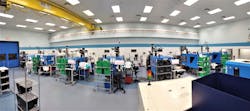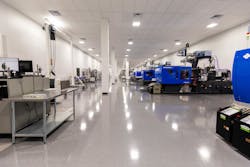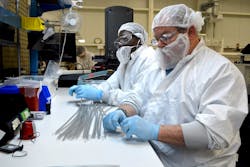By Karen Hanna
After two-plus years of the pandemic, plastics processors and analysts say the medical-device market is healthy and strong. At least three companies in the segment — Westfall Technik, Putnam Plastics and Currier Plastics — have invested in capital projects to expand their capabilities.
According to Grand View Research, a market research and consulting company, the sector was worth $176.7 billion in 2020, with a 5 percent compound annual growth rate forecast through 2028. Major brand owners include Johnson & Johnson, Medtronic and Boston Scientific.
"The rising prevalence of chronic diseases and the increasing geriatric population in the country are the key market drivers," Grand View states in its report, "U.S. Medical Device Manufacturer Market Size, Share & Trends Analysis Report by Type."
Grand View's report notes that demand for products related to the pandemic, combined with the need for devices to diagnose, monitor and treat chronic illnesses, has created a "scenario [that] set off lucrative opportunities for both existing players and new entrants."
The experiences of Westfall Technik, Putnam Plastics and Currier bear that out.
Since its establishment about four years ago, Westfall Technik, a maker of both medical devices and packaging, has enjoyed a stratospheric rise. In addition to expanding clean-room space at existing plants, it's now celebrating the opening of yet another facility — a 40,000-square-foot medical molding plant near Chicago, in Antioch, Ill., in a building it leased and renovated just last year.
Meanwhile, Putnam Plastics, a manufacturer of custom tubing and components for minimally invasive medical devices and catheters, recently launched a sister company, Putnam Medical, a 20,000-square-foot-facility with Class 7 clean rooms of 4,500 square feet and 1,200 square feet, for R&D. The move follows the company’s opening last year of a 57,000-square-foot expansion, all in the same Dayville, Conn., industrial park.
The third company, Currier, an Auburn, N.Y., custom molder that employs about 200 people, is a new entrant to the medical-products space.
Rob Knapp, manager for marketing and new business for the company, which began adding medical products to its repertoire about five years ago, credited the company’s diversification strategy with insulating it from disruptions over the last few years. Previously, the company had focused on making packaging products, including the single-use items hotels provide to travelers.
“If we didn’t do it, we might not be open,” he said. “... If we didn’t make that transition, I don’t know where we would be today, because we brought on a lot of new business.”
Technology first
As a contract manufacturer that provides services from product design, to mold construction, final part production and assembly, Westfall Technik makes drug-delivery devices, as well as diagnostic devices — everything from insulin pumps and cuvettes to products to support immunotherapy.
The company’s success starts with technology, CEO Mark Gomulka said.
Its vision — which has guided it to expansions and acquisitions that have made it a 2,500-employee behemoth — revolves around Industry 4.0.
The company’s proprietary enterprise resource planning (ERP) system leverages data captured by a cloud-based quality management system (QMS) to track parts, machine conditions and environmental factors. Behind its construction is a Westfall Technik executive who “lives by algorithms,” Gomulka said.
“You can potentially imagine what a contract manufacturer does, to the SKU level, component level, across not only sales — that’s the easy part — but even from pipelines to sales, to quality, to machine performance, to [accounts receivable] past due, to everything possible, through inventories. Imagine having an algorithm that runs through everything, and it tells you exactly what that customer, what that machine, what that piece of equipment, is doing.”
As part of a trajectory Gomulka calls “incredible,” Westfall Technik has expanded its medical parts customer portfolio and clean-room space at a fivefold clip, in two years landing the construction of 300 different molds for products.
Innovation leaders
For medical-parts customers, technology is a strong selling point.
With printing, laser-marking and overmolding capabilities, extrusion processor Putnam offers customers an array of services. The company, which employs more than 390 people, makes tooling and builds some of its own machines in-house.
“We continue to pioneer innovative solutions to medical device challenges,” marketing manager Kaitlin Sullivan said.
Company technologies produce tubing that has advantages over traditionally made alternatives, she said.
For example, its Total Intermittent Extrusion (TIE) technology results in tubing with varying degrees of rigidity in a single extrusion — a capability that allows it to make composite catheter shafts that provide a combination of flexibility and stiffness for insertion. Such shafts would otherwise require manual assembly.
In addition, the company can make coil- and braid-reinforced multilumen tubing with multiple passages through which fluids or solids can travel, and its polymer marker bands are a cost-effective alternative to markers employing gold or platinum, Sullivan said.
The last two years have brought double-digit growth, President Ryan Dandeneau said.
Overall, “Outlook is very positive," he said. "Our backlog is stronger than ever. A lot of money [is] being invested in our industry by medical device companies to develop new catheters and go new places in the anatomy.”
If you build it, they will come
Westfall Technik and Currier also are anticipating growth, with an approach that banks on the confidence that customers will come.
That is how Westfall Technik's newest facility has filled up so far, Gomulka said.
The transformation took just six months.
There's no sense in waiting to land work before making an investment — prospective customers need to see that processors already are prepared to meet their needs, according to Knapp.
“Because, at the end of the day, customers that need this type of work, they want to know you have it, that you’re not just a mom-and-pop shop,” said Knapp, who, in his three years at Currier, has been working to show off the company’s expanding capabilities.
“You’ve got to get yourself out there for the medical side, because when you’re in the commercial-products/goods segment, it’s more regionalized. … They want to know where you are, are you within 150 miles of their location for filling? Versus medical, it ships all over the world. Once you’re into the top tier of the medical suppliers bucket, they want to know they’re getting good products, regardless of the cost to get it there.”
Out with the old
With the opening of its Antioch facility, Westfall Technik has planted its flag in a new region.
The Antioch facility — which has housed a succession of molding shops — had been vacant since 2020 and had not been renovated in 20 years when the company leased it last spring. “The bones were already here,” though, Gomulka said, including three Class 8-certified clean rooms.
But everything had to be updated.
“Imagine going outside, from new parking lots ... starting at the roof and air handlers, and then working our way through warehouses, clean rooms, all the manufacturing areas, offices, quality labs, everything, right down to where management and engineering and everybody else sits, that facility went through an entire rehab.”
“They have a very good name, and a very high level of acceptance in running in clean rooms with the lowest level of particulates generated; two, they are energy-efficient, and also have capability from the process development, process stability, and just the quality of the machine,” Gomulka said.
Westfall Technik is in the process of building its proprietary M3 micromolders for Antioch. The machines — which Gomulka calls “the Apple iPhone of the micro injection molding world”— use built-in hot runners to provide total control over the heating of the melt from the injection nozzle to the cavity.
The M3s optimize how resin is used, preventing waste — a benefit that’s attractive to customers that could be paying as much as $5,000 per pound for bioabsorbable materials.
“We do melt plastic, but we look at it totally differently, and we’re able to get rid of over 90 percent of the waste stream on some of the most exotic materials that can be implanted into the human body ... bone screws and things like that,” Gomulka said.
Another in-house technology — a six-axis robot — works alongside the machines. While it won’t replace humans, the advanced automation presents potential for the company to view staffing differently, as well as to stand out from the competition, Gomulka said.
“Do you need a person at the end of each machine? … How about bringing in technology? And those folks get to learn how to service, how to install, how to program. Now, you’re creating jobs that are not $15 an hour; you’re creating jobs that are 20, 25, 30, 35 dollars an hour, and now you have a living wage.”
So far, about 40 people are working three shifts, five days a week at the Antioch facility; the vision is for an eventual workforce of 120 to 140 people.
The company has had no trouble finding employees; according to Gomulka, even slots for voluntary weekend overtime fill up fast. The chance to work in a totally rebuilt molding shop accounts for a lot of the appeal.
“Anytime something like this comes back up, and it’s totally refurbished and brand-new, with brand-new customers, brand-new molding machines … and you have brand-new robots, brand-new everything, they want to be a part of it.”
New to you
Like Westfall Technik, which moved into a facility another molder had departed, Currier capitalized on an opportunity when another molder moved on.
In Currier’s case, it snapped up the business — and even the molds — of a molding shop that had decided to drop a job involving legacy medical products, in favor of concentrating on high-tech electronics. What was old news for the other molder became Currier’s first foray into clean-room molding.
“We actually transferred in all these assets, so the molds, the automation for the five injection molding machines, were already being used somewhere else. We pulled them in and brought them and requalified them, so, at the end of the day, we saved the day because the customer could have been without product,” Knapp said.
The company’s medical-parts equipment includes five injection molding machines in the clean room, a blow molding machine that is tied into a large bagging system and a new, smaller blow molding machine that Currier acquired earlier this year; for quality control, the company also has coordinate measuring machines.
Bringing the molds up to spec presented a special challenge.
“We had to take molds that have been in production for eight to nine years and requalify them as [if] they were brand-new, which was very difficult to do,” Knapp said. “We had to be held to a different standard.”
To accommodate the job, Currier transformed a 9,000-square-foot warehouse into a clean room that is U.S. Food and Drug Administration-registered.
“This is a building within our building. ...” Knapp said. “It has its own separate HVAC system; it has its own HEPA filtration system, and it’s monitored like any other certified Class A [clean room].”
After a renovation that took a few months, and a requalification period that took quite a bit longer, the company now has been producing clean-room parts for about a year.
Currier, which also runs mobile white rooms, offers a variety of medical products, mostly consumable, point-of-care items that are used in testing blood glucose or conditions like cancer, COVID-19 and the flu. In some cases, it ships the products it makes back to its customers to be filled with reagent.
Looking ahead
Newcomers are going to continue to disrupt the medical-device market, predicts KPMG, a global network of professional firms that provide audit, tax and advisory services.
It projects global annual sales of devices to top $300 billion in the U.S. over the coming years, and to near $800 billion by 2031.
"Although medical-device manufacturers have been impacted by elective-surgery and care-delivery disruptions, the subsector will recover, and deal activity will accelerate as COVID moves from pandemic to endemic status," KPMG says in a report.
Knapp acknowledged that the pandemic created uncertainty as Currier planned for this year. But now, the company, like Westfall Technik and Putnam, is charging ahead. Seeing the potential to grow its health-care portfolio, which makes up about half its business, it is considering a clean-room expansion this summer.
Knapp believes the company’s commitment to quality and value- added services, such as heat-sealing and assembly, will win over even more customers. Parts orphaned by other molders could continue to present opportunities.
As restrictions put in place because of the pandemic wind down, Putnam’s Dandeneau said demand for some devices used in elective surgeries — which were canceled initially to conserve hospital capacity — is bouncing back, at a higher volume.
“Regardless of [the] pandemic, people still need diagnosis and treatment of various diseases,” he said. “Again, aside from some slight dips in elective procedures, the medical device market continues to grow, and we will continue to invest in our business to support that growth.”
Meanwhile, Gomulka is turning his gaze to locations outside the U.S. — further expansion beckons for Westfall Technik. Central America and Europe could be next.
He is effusive in expressing his outlook.
“We’re probably, in the next four or five years, we’re going to be double what we are,” he said.
Karen Hanna, senior staff reporter
Contact:
Grand View Research Inc., San Francisco, 415-349-0058, www.grandviewresearch.com
KPMG International Ltd., https://www.kpmg.us
About the Author
Karen Hanna
Senior Staff Reporter
Senior Staff Reporter Karen Hanna covers injection molding, molds and tooling, processors, workforce and other topics, and writes features including In Other Words and Problem Solved for Plastics Machinery & Manufacturing, Plastics Recycling and The Journal of Blow Molding. She has more than 15 years of experience in daily and magazine journalism.




